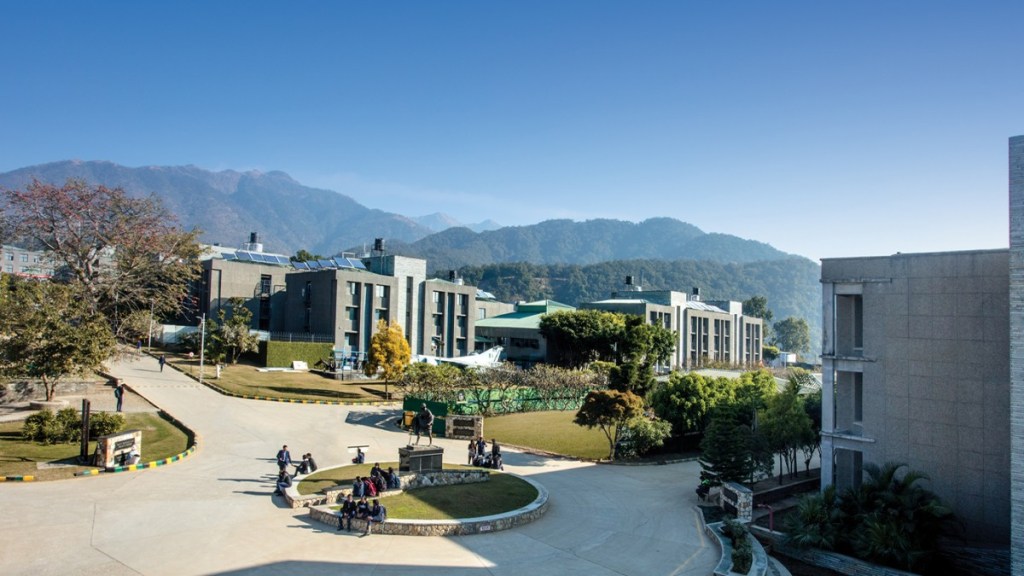The School of Law, UPES University claims to have a specialised programme, Disruptive Technologies Law. The institute in an effort to expand the reach has further packaged courses with the five year Undergraduate (UG) programme. With this integrated programme, it aims to address the legal aspects of emerging technologies such as Artificial Intelligence (AI) and blockchain. Unlike traditional diploma or certificate courses, this is an undergraduate honours programme regulated by the Bar Council of India (BCI), which provides students with specialised expertise alongside their legal education, Abhishek Sinha, associate dean, UPES School of Law, told FE Education. “We have revamped our curriculum to align with technological advancements and industry demands. Through industry feedback and review, we have updated our courses, including legal subjects, to ensure relevance and readiness for disruptive technologies,” he added.
Further, the institute claims to have developed ABSIN (Artificial Intelligence-powered Digital Law Professor) which is powered by ChatGPT-4. The institute claims to have created a clone of Abhishek Sinha, an Associate dean and professor at UPES School of Law. The tool aims to provide legal education using modern technologies. “It has learned my voice, it is a clone now. . It is a digital persona and we can curate videos to teach within minutes because we do not require recording or editing. The content is generated by ChatGpt-4. Still, we also curate it further as the AI-developed content is not always correct” Sinha said.
The institute in its effort to make the courses lucrative enough for students have packaged these with 10 different integrated specialisation courses. The courses’ duration is five years for which the institute claims to charge a fee of Rs 19 lakh for the complete course, per student. Also, it claims to offer Bachelor of Business Administration (BBA) LLB honours and Bachelor of Commerce (B.Com) LL.B. honours of five years, each. For both courses, it claims to charge a fee of Rs 20 lakh for entire course, respectively. Additionally, it offers a three-year LLB Programme with a total course fee of Rs 10.5 lakh and a one-year Postgraduate (PG) course with a complete fee of Rs 2.79 lakh. Further, the institute claims to offer part-time and full-time PHD programmes for which it charges Rs one lakh per semester, per student. Institute further claims that for its PHD programmes, it provides a fee waiver of 75% after which candidates have to pay Rs 25000 per semester, also it claims to provide a monthly stipend of Rs 30,000 to its full-time PHD students. For its UG students, the institute claims to provide multiple scholarships including academic scholarships,bonafide Uttarakhand student and ‘freeships’ – fee reduction programme. The institute claims to have a combined strength of 2800 to 3000 students in all its courses. “We offer regulated courses where students can conduct empirical or doctrinal studies on research problems. In addition, we provide numerous certificate courses, workshops and value-added programmes. Many of these courses are facilitated by industry experts, often practising professionals from prestigious law firms. These experts conduct on-campus sessions and online classes, ensuring students receive practical insights and course credits,” he added.
Moreover, the institute claims to have a Career Service Committee to assist students in terms of provision of internships and placement opportunities. As per the college, in FY24 out of 454 undergraduate students, 430 graduated and 294 students were placed across different sectors and streams. The institute stated that graduates have been placed in banks, corporations, law firms, NGOs while some choose to pursue further education. The institute further claims that the average package students earned is between Rs 8-9 lakh while the highest package stood at Rs 16 lakh in the last financial year. “In our institution, not all students aim solely for corporate or law firm placements. A significant portion of law students also aspire career in other fields such as civil services, in NGOs and legal journalism,” Sinha said.

